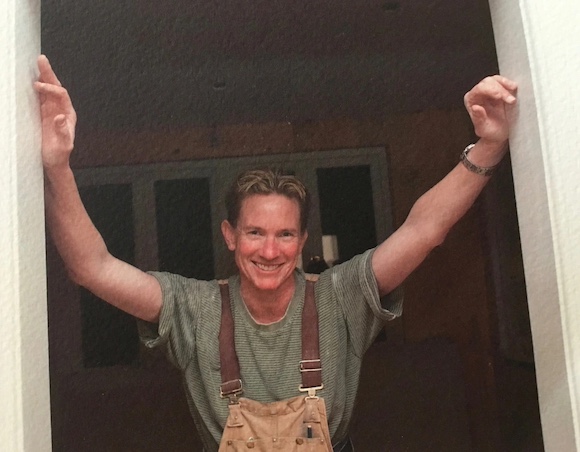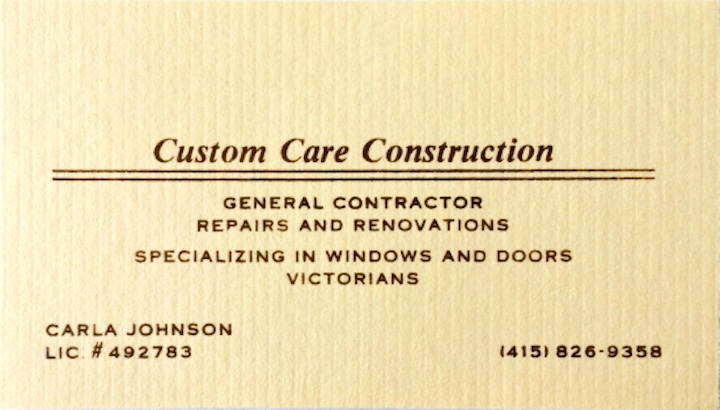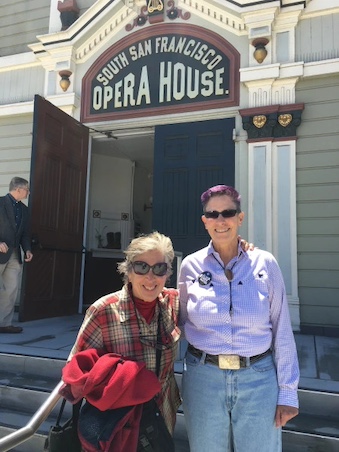Carla Jean Johnson Presente: Difference between revisions
EvaKnowles (talk | contribs) added abstract for series |
m Protected "Carla Jean Johnson Presente" ([Edit=Allow only administrators] (indefinite) [Move=Allow only administrators] (indefinite)) |
(No difference)
| |
Latest revision as of 15:26, 8 August 2024
"I was there..."
by Molly Martin, 2016, originally published on tradeswomn blog
Carla Jean Johnson.
Photo: Anna Kuperberg
| This article is the first of a series of three pieces in which longtime tradeswoman activist Molly Martin profiles female friends in the trades: Carla Jean Johnson, a carpenter and disability activist; Joan Weir, a welder who fought through unsafe working conditions and discrimination; and Susie Suafai, who helped bring women into the trades through apprenticeship systems. |
I was delighted to be asked to eulogize Carla Jean Johnson at a memorial for her at the Bayview Opera House on July 23, 2016, which would have been her 57th birthday. The Opera House is just now reopening after a restoration which Carla, as head of the Mayor’s Office on Disability, had a big part in. Her office provided vital funding for disability access, and now wheelchair users can enter through the front door. Here’s what I said about Carla.
Carla Johnson was my bestie. I loved her. I introduced her to her wife Anna. Carla and I worked together as building inspectors through the 90s; we worked on each other’s old houses for decades (of course we had permits for everything). Together we negotiated the prejudices we faced as women in the building trades. There were many. Still are.
From the time she made her first cutting board in high school shop class, Carla Johnson wanted to be a carpenter. She quit school at Cal to follow her dream and didn’t finish college till years later. She became a builder, working for small contractors and for a women’s carpentry collective called Seven Sisters Construction.
Carla’s CCC card.
In those days, it wasn’t easy for women to get training (still isn’t). Carla learned the carpentry trade by reading. She told me she would just ask at the end of every day, “What are we doing tomorrow?” Then she would go home and open her carpentry books and the first thing the next morning she’d start throwing the terminology around. “So, we’re going to put the joists 16 inches on center, right. We’re going to start with the header joist.” She was assigned to be crew boss because she was the one who consistently showed up on time.
Later, she did maintenance on Victorian buildings for a property management company. She got a lot of love from tenants for keeping the systems going. She was a skilled locksmith. She could rehang a door that had been kicked in before the tenants got home from work. She could jerry rig the boiler so tenants would have hot water till the boiler repairperson could get there. Carla loved old buildings. She loved old houses, old trucks, old things. Things with some history in them.
With my friend Huli at the restored Bayview Opera House.
For a time she had her own business, Carla’s Custom Care Construction. No doubt she worked on the homes of some of you in this room. Then she got a civil service job working as a carpenter at the Department of Public Works where she felt privileged to work on City Hall and other historic public buildings.
I didn’t meet Carla till after the saw accident that mangled her left hand and changed her life. It was shocking that such an accident could happen to her. She was the most risk-adverse safety-conscious person I ever met (a trait that sometimes drove her friends crazy).
She told me she couldn’t even remember the date it happened in 1992, which she said is a good thing for people with PTSD. She lost her little finger and she suffered through many long surgeries to repair her ring finger, and a year of rehab. She was disabled. She couldn’t earn a living as a carpenter anymore.
She told me the first thing that her workers comp attorney said to her when she got out of the hospital was, “I want to tell you about this new law that just went into effect.” Her employer had an obligation under Title 1 of the Americans with Disabilities Act to provide her with a reasonable accommodation–to place her in a job where she could still use the skills without the tools. That’s how she came to work at the Department of Building Inspection. Carla was happy when she was assigned to the Castro as a district inspector. She always loved working with “my people.”
One job of a building inspector is to perfect the art of saying no, not always an easy thing to do, especially if you’ve been on the receiving end as a contractor who has to do the job over after you fail inspection. Carla, with her quiet thoughtful demeanor, could say no and make you feel grateful for her advice.
She developed a reputation as a stickler for the building code’s technical details. Competent contractors who played by the rules liked her. Sloppy mechanics with poor workmanship hated her. Stairs are required by code to be the exact same height for a reason. Varying stair heights can cause falls. Carla carried a measuring tape and she used it. Our friend Nina Saltman just now told me about a job she ran that failed Carla’s inspection because it was a quarter inch off. She is not the only one who tells that story.
Carla became an expert on disability access. And she became a skillful advocate for the rights of people with disabilities. At DBI she saved us taxpayers money by resolving disability issues out of court. Then she moved over to the Mayor’s Office on Disability and she eventually was promoted to head that department.
When Carla called me to tell me she had just been diagnosed with stage IV metastasized breast cancer, I said, “I’m coming over now.” I ran the five blocks to find Carla and Anna standing in front of their house conferring.
“I need help,” Carla said when I got there.
“Anything,” I said, grateful there was something I could do to help my sick friend.
“I need you to get up on the roof.” She wanted me to accompany her to check whether the roofers who worked on the house next door damaged her roof. This was so very Carla. She wouldn’t be able to rest until she made sure her roof was sound.
Carla was fascinated by the details of city government. She would entertain herself during nights of insomnia by watching commission meetings on the public TV channel. I will especially miss talking about city government and politics with Carla over a beer at the Wildside or the Lucky Horseshoe. It was a topic that bored our wives and most friends.
Carla was the kind of civil servant all citizens want working for us, who understands she is there to make our lives better. But at heart she was a carpenter, a builder. She built a life that impacted so many of us, she built institutions, she built buildings, she built a marriage, a home, a neighborhood, lasting relationships.
We marvel at her legacy. And now those of us who are left must do the maintenance.
Read more profiles of San Francisco Tradeswomen:



